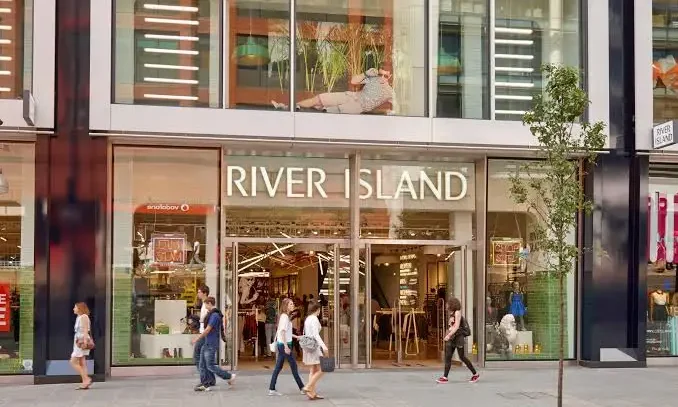River Island’s predicament: High Court rescue buys time, not certainty
River Island’s restructuring plan has been approved, allowing it to shut 33 stores, reduce rents on dozens more and secure emergency funding. Experts say the ruling offers a vital breathing space but stress that reinvention – rather than contraction – will decide whether the fashion chain can thrive again.

Register to get 1 free article
Reveal the article below by registering for our email newsletter.
Want unlimited access? View Plans
Already have an account? Sign in
River Island has won a crucial lifeline after a High Court judge sanctioned its restructuring plan, allowing the embattled fashion retailer to push ahead with sweeping store closures, deep rent cuts, and a debt write-off. The ruling came just days before the company warned it would run out of money by the end of the month, averting a collapse that could have put thousands of jobs at risk.
The decision means River Island will now shutter 33 stores, cut rents across a further 71 shops – some to zero – and unlock a £40m emergency loan from its founding family’s investment vehicle, Blue Coast Capital. For a chain that employs 5,300 staff in its stores and 950 more at its head office in west London, the court’s approval has bought breathing space. Yet the move also raises thorny questions about the balance of power between retailers and landlords, and whether cost-cutting alone can steer the brand back to relevance.
River Island’s proposals, set out in an 800-page document prepared by Big Four accountancy firm PwC, were first circulated to creditors in June. The plan won the backing of around 80% of creditors by value, but failed to secure the required 75% support in each individual creditor class. That left its fate to the High Court.
On 8 August, a judge used new “cram down” powers to override objections from landlords and other dissenting creditors, ruling that none would be worse off under the restructuring than they would have been if the company had fallen into administration. The decision cleared the way for River Island’s debt restructuring and rent reductions to go ahead.
Notably, landlords had expressed strong resistance to the plan. British Land, one of River Island’s major landlords, reportedly hired law firm Hogan Lovells to scrutinise the deal and ultimately abstained from the creditor vote. Some owners argued the family-run chain had “overstretched” itself and left property owners carrying the burden.
Yet with the ruling in place, the retailer has avoided a funding shortfall of £10m in September – rising to a projected £50m by year-end – that could have triggered administration.
The crisis did not arrive overnight. River Island reported a pre-tax loss of £32.2m last year, compared with a profit of £7.5m the year before, while sales fell 15% to £701.5m. Rising operating costs, global supply chain disruption, and the cost-of-living squeeze have all weighed heavily.
The brand has also faced increasing pressure from online fast-fashion giants such as Shein and Temu, as well as established competitors including Zara, H&M, and Uniqlo. Shoppers, particularly younger consumers, are demanding greater speed, convenience, and variety – something River Island has struggled to deliver across its large bricks-and-mortar estate.
The company itself has acknowledged the problem. In documents submitted to creditors, River Island said it was left with “a large portfolio of stores that is no longer aligned to our customers’ needs”. The restructuring plan is designed to reduce that footprint and slash running costs while the business retools for a more digital-first strategy.
River Island’s leadership remains upbeat about the road ahead. Ben Lewis, chief executive, said the ruling gives the business a platform to deliver on its “clear transformation strategy” and highlighted “recent improvements in our fashion offer and shopping experience” as proof that change is already taking hold. He added that the retailer was “grateful to suppliers, landlords and other stakeholders for their constructive engagement and shared confidence in River Island’s future.”
It appears that River Island is looking forward to becoming a leaner, more agile business in the very near future, but at the same time sceptics question whether transformation will require more than financial restructuring.
While many creditors backed the plan, landlords remain bruised. Owners of 24 River Island stores have been asked to accept no rent for three years, while others will see reductions ranging from 25% to 75%.
One landlord told The Telegraph: “This is family-run, they’ve just overstretched, and it’s unfair that the landlords will struggle because they haven’t maintained their relevance.”
Legal experts warn the case could set an important precedent. Lucy Trott, managing associate and insolvency expert at law firm Stevens and Bolton, said the “cram down” was a lifeline for River Island, enabling the Lewis family’s £40m injection and sweeping rent reductions. She noted that dissenting creditors “reportedly included landlords, local authorities and trade creditors” but the court was satisfied they would not be worse off than under administration or liquidation.
Trott added that while an appeal is technically possible, creditors may hesitate given the recent Thames Water ruling and the risk of being saddled with additional legal costs. “Restructuring plans appear to be the new ‘flavour of the month’ for retailers,” she says, replacing the company voluntary arrangements (CVAs) that once served a similar purpose.
For retail analysts, River Island’s plight reflects a broader malaise on the high street. Marty Bauer, retail and ecommerce expert at Omnisend, said the closures are “a stark reminder of the ongoing challenges faced by retailers operating on the British high street”.
He pointed to the rise of ultra-low-cost brands like Shein as a major disruptor, noting that “spiralling living costs have pushed many consumers to seek cheaper alternatives that prioritise style over quality”. Bauer also argued the move aligns with an industry-wide rethink: brands are cutting down on large stores in favour of smaller, more efficient ones, while investing heavily in digital capabilities.
He stressed that the future is not solely online, however. “Many shoppers still value the tactile in-store experience and personal interaction. This is where the key to success still lies,” Bauer says. As examples, he highlights Uniqlo’s growth, attributing it to a curated product range, seamless checkout process, and unique in-store services like alterations.
Even with the restructuring in place, River Island must now prove it can reinvent its brand. Nick Sherrard, managing director at Label Sessions, warns that accountants and lawyers can only go so far: “The business now needs the creatives and marketeers to find a reason consumers should care about what it has to offer.”
He argues that River Island is “a much-recognised brand” rather than a “much-loved” one, and questioned whether management had a bold vision beyond cost-cutting. “There are very few examples of companies shrinking into greatness,” he points out.
For Sherrard, turning around a business that lost £33m last year will require “a very big idea to change its trajectory.” At present, he suggested, River Island’s leadership is either keeping such plans under wraps, or is yet to come up with them.
The High Court’s approval has prevented River Island from collapsing in the immediate term, but the challenge of long-term renewal looms large. Landlords may yet pursue an appeal, though legal experts suggest they may hesitate given the potential costs.
For River Island, the question is whether it can leverage this reprieve to genuinely transform. That will mean more than downsizing its estate. It will require investment in digital channels, innovative in-store experiences, and a renewed creative vision that convinces shoppers to return.
Fashion retailers that largely operate on high streets up and down the country have suffered numerous casualties in recent years, from Arcadia to Debenhams, and survival has often depended on bold reinvention rather than incremental cuts. River Island’s fate now hinges on whether it can be more than the next headline casualty.
For now, the company has won time. What it does with it may decide whether River Island can truly reclaim its place on the British high street, or whether this rescue plan simply delays the inevitable.







